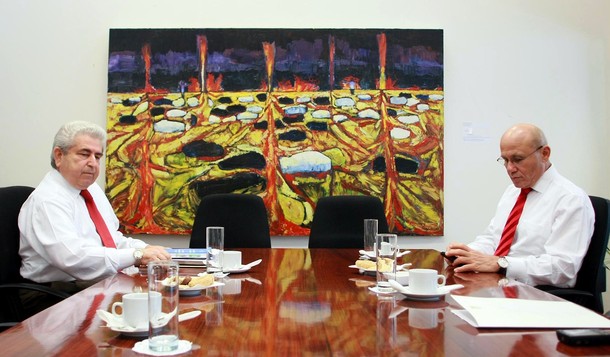
Oil Excavation Crisis in Cyprus Threatens Turkish-Greek Cypriot Negotiations
Publication: Eurasia Daily Monitor Volume: 6 Issue: 140
By:

The U.N.-led peace talks launched by the Turkish Cypriot leader Mehmet Ali Talat and his Greek Cypriot counterpart Dimitris Christofias in September 2008 aiming to find a comprehensive solution to the Cyprus problem has entered a new phase. On July 20 at the Peace and Freedom Day ceremony in the Turkish Republic of Northern Cyprus (KKTC) to celebrate the 35th anniversary of the 1974 Turkish military intervention, Ali Talat stated that it might be possible to reach a comprehensive solution by the end of the year.
However, he said that all parties must act with a constructive understanding, reflecting the stance adopted by the Turkish Cypriot side. Deputy Prime Minister Cemil Cicek stressed that the Cyprus issue should not be linked to Turkey’s European Union membership aspirations, and said the negotiations cannot continue endlessly. Reaching a comprehensive resolution is in the best interest of all parties, without exception: "It should be known that it is impossible for Turkey to give up its responsibilities as the motherland and guarantor country. Turkey will never be forced to choose between Cyprus and the European Union" (Today’s Zaman, July 21). The Turkish President Abdullah Gul sent his congratulations to Ali Talat, and echoed Cicek’s views. Gul stated that "the negotiations cannot go on forever. The good will of Cypriot Turks should not be punished, if their endeavor toward finding a solution does not produce any result" (Milliyet, July 21).
It appears that Turkey has decided to finalize the Cyprus negotiations this year, in order to avoid any potential damage to its E.U. membership plans. The E.U. has set December 2009 as the deadline for Turkey to open its ports and airports to Greek Cypriots, and failure to comply might result in the suspension of talks on membership (EDM, June 12).
In addition to Turkey’s E.U. membership agenda, concerns over the Greek Cypriot oil excavation crisis in the eastern Mediterranean have again escalated into a war of words between both sides. This first ensued after the Greek Cypriot’s opened an international tender for its previously declared hydrocarbon excavation sites around Cyprus on August 16, 2007. Turkey considered the Greek side’s policy, as a political maneuver to highlight the Cyprus issue internationally. However, when a Norwegian firm found that seismic mapping of the region shows $400 billion worth of hydrocarbon resources may lie underneath the declared hydrocarbon excavation sites (www.dispolitikaforumu.org, August 26, 2007) international oil companies turned their attention to the region. Turkey harshly criticized the Greek Cypriot’s attempt to open the excavation sites for oil exploration (Yeni Safak, August 2, 2007).
Recently, the hydrocarbon excavation crisis has resurfaced as a result of the Greek Cypriot daily Politis claiming that Chevron bought the seismic maps showing the hydrocarbon sites around Cyprus (Hurriyet, July 19). Given that the U.S. Ambassador to Cyprus Frank Urbancic stated in May that an American oil company will launch oil and natural gas excavation in southwestern Cyprus (Milliyet, May 28) it is likely that the report which first appeared in Polity might be correct.
Possibly in response to the Greek Cypriots’ initiative, the Turkish government allowed its state-owned oil company Turkish Petroleum Company (TPAO) to commence excavation in the international areas of the eastern Mediterranean Sea (www.internethaber.com, July 16). In response, the Cypriot Foreign Minister Markos Kyprianou accused Turkey of behaving like a classroom bully, and said that "the energy chapter cannot open while Turkey is attempting to block the Republic of Cyprus, an E.U. member state, from utilizing its own energy resources in accordance with international law" (Today’s Zaman, July 16). On the energy excavation dispute between Turkey and Greek Cypriots the E.U. suggested finding a solution through international arbitration, which would deal with the dispute (Milliyet, June 14).
As the E.U. deadline in December draws nearer for Turkey to open its ports and airports to Greek Cypriots, and failure to comply might result in the suspension of talks on membership, American companies are turning their attention toward Cyprus. U.S. companies might base this on the expectation that a settlement will occur between the two sides by the end of the year. President Gul has reaffirmed that Ankara wants the negotiations to be finalized soon, and that at the end of this year a referendum should take place to unite the island (Voice of America, July 13).




